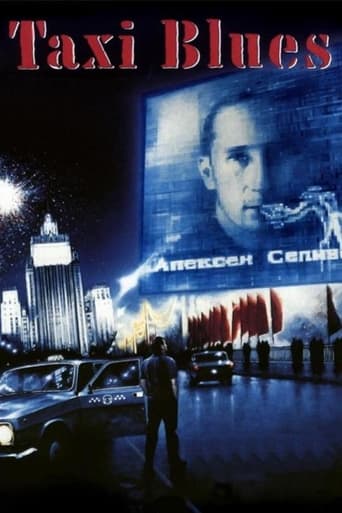akoaytao1234
PLOT: Ivan,a hot headed taxi driver hunts down Lyosha, an alcoholic saxophonist who stifled his fare the day before. A love-hate friendship ensues but things change when an American producer helps Alyosha's career to take off. Taxi Blues(1991), started as a very interesting travelogue about 1990 Moscow but as the film delves towards the the crazy leads, it just started to fell apart. The story about the old vs the new felt very underdeveloped and somewhat too silly for its own good. It just lacks the subtext of the early scenes to keep me interested. In addition, it kinda offset the grandness of the beginning started to be lost in a milieu of unneeded craziness between Alyosha and Ivan. [2/5]
khubbard-1
*Please note: This review discusses many key events of the film, including the end. Do not read if you have not seen the movie!!!Taxi Blues is a film about control. It isn't, however, as simple as it initially seems. At the film's conclusion, the audience is left to ask, "Who's really controlling whom?"At the beginning of this film, Chlykov has complete control of his life. He manages his cab, and his side job of selling alcohol, with an iron fist and the facial expression to match. He is the master of his domain and no one in his or her right mind would dare to question his authority in any way.The problem is that Lyosha is not in his right mind. His life is careening out of control and he has one priority. Alcohol. From the minute that he requests his first bottle from Chlykov, their lives become irrevocably entangled. In the beginning, it is very clear where the power lies. As the film continues, however, it becomes harder and harder to tell who is controlling whom. Although he does not seem to realize it, Chlykov's life begins to revolve around the very man he seeks to reform. As a result, aspects of his own life start to slip from his control.For example, when Lyosha begins to seduce his girlfriend, Chlykov, in a desperate attempt to prove his authority, smashes Lyosha's saxophone and then engages Christina in an aggressive sexual act against her will. For those few minutes, Chlykov is free of his self-induced commitment to Lyosha. However, his freedom is short-lived. A few minutes later the phone rings and he is soon back at the jail to meet Lyosha, once again putting his own life on hold.By the end of the film, the roles have reversed. Lyosha gets his life together, at least temporarily, and is on top of the world as a beloved, world-renowned musician. Chlykov's life, however, is reminiscent of Lyosha's at the beginning of the film. He severs connections with his girlfriend, his friends and his once structured existence. It is no coincidence that in the last scenes of the film, Chlykov is in a speeding car, spinning wildly out of control.
zardoz12
In his "Movie & Video Guide", Mr. Maltin (or one of his reviewers) writes of the musician in "Taxi Blues": "... the latter, who embodies the spirit of the oppressed Soviet artist-intellectual, plays his saxophone solos to block out the reality of his existence." It is true that the man sits in reveries, playing sax solos in his head, and is a brilliant musician. But it is more evident that he has a deep love affair with the bottle: the first time we see him, he is drunk; he goes to jail twice for his lubricated actions; he is homeless because his girlfriend threw him out over it; he has lost gigs due to his flaky behavior. In a nation of future AA members, Zaitchenko's character stands out because he has a talent, and is quickly destroying it. This is why the taxi driver is important; in his own crude way he tries to stabilize the drunk, and he is our window through which we see the sax player. We also get to see the outskirts of Moscow: the dump, seedy allyways, the brutalist apartment complexes, grimy little jails with rebar for cell bars. Truly a time capsule of Muscovite life before everything ended.
grob248
Besides this, I have only seen one movie by Pavel Lungin, namely Luna-park, which also comes off highly recommended. Taxi Blues is an excellent work all in itself. Lungin very well transcends the chaotic atmosphere in Russia during the late Perestroika period, and prior to the break-up of the Soviet Union itself. The tumultous relationship between two main characters represents bipolar parts of the Russian society, and shows degradation of the social fabric. Piotr Mamonov (who is also the leader of the well-known Moscow rock-band Zvuki Moo) turns in an impressive performance as Lyosha - a westernized, alcoholic Jewish mucisian. The rest of the characters are equally picturesqe, be it the strong willed, conservative, nationalistic taxi driver, or his neighbor, an old man of the Stalinist generation. The film's unsettling pacing and incessant moodswings further contribute to the overall picture. An excellent film from one of Russia's leading directors.
